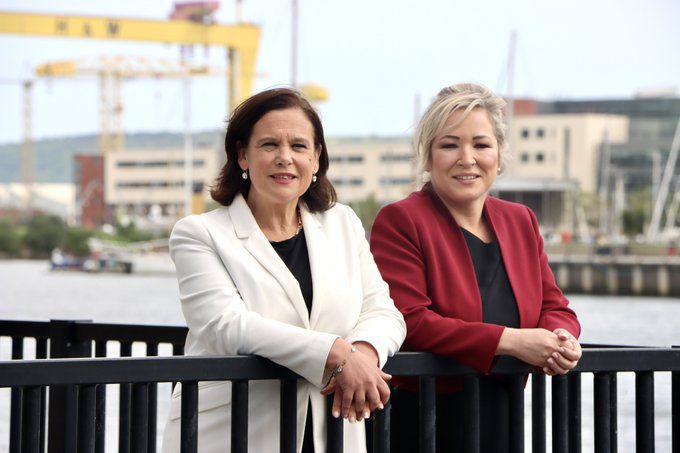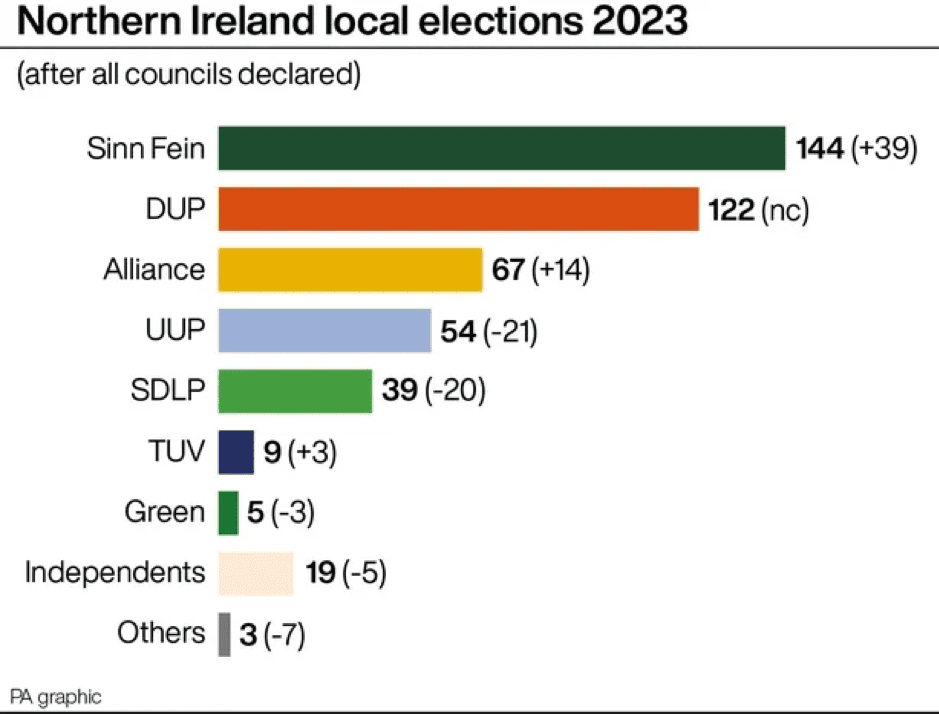
Sinn Féin leaders Mary Lou McDonald and Michelle O’Neill following the counting of votes.
Irish republicans Sinn Féin emerged as the largest party in Northern Ireland after local election results, in which smaller parties and political moderates on both sides of the sectarian divide were squeezed out.
The party capitalised on smart vote management and a decline in support for the more moderate nationalist party the SDLP, consequently gaining 39 new council seats. Sinn Féin leadership is calling for a return of the region’s long-suspended parliament, Stormont.
Elections in Northern Ireland are generally defined by a tribal affiliation—between Catholics and Protestants with the statelet—and without a functioning political executive since the Democratic Unionist Party (DUP) withdrew from the Stormont assembly in 2022 in a dispute over post-Brexit trading arrangements.
In general, smaller parties fared worse in the elections which saw a wipeout for the conservative Sinn Féin splinter group Aontú and defeat for the Trotskyist party, People Before Profit, and Greens—though the liberal Alliance group saw gains.
The biggest losers of the night were the more moderate Ulster Unionist Party (UUP) with loyalist hardliners also seeing some gains under the banner of the Traditional Unionist Voice (TUV) which has picked up steam in its opposition to the Brexit deal.
The results mimic what was seen last year for national assembly elections. Then, Sinn Féin performed much better than expected, largely to the detriment of the centrist (Social Democratic and Labour Party) SDLP. Sinn Féin, over the past decade, has surpassed SDLP as the primary electoral vehicle for nationalists.

The victory adds weight to Sinn Féin’s case for becoming the natural party of government in Northern Ireland. The party is now strongly tipped to win the next general election in the Republic on a left-wing populist platform.
The former political wing of the Irish Republican Army (IRA), the now demilitarised party has pivoted to the political centre in recent years: they held attendance at the recent British coronation in London and have watered down objections to NATO, both perceived as signs of moderation.
Northern Ireland’s primary unionist party, the DUP, managed to hold their own in the elections. Political unionism in Northern Ireland has been undergoing an internal crisis since Brexit due to changing demographics which saw the erosion of a Protestant majority in Northern Ireland and a post-Brexit deal which cleaved the statelet’s relationship with the UK.
The DUP has seen multiple leaders in recent years due to heavy infighting, with pundits believing that the party is unable to decide a path forward in the face of new military pressures.
Largely at peace since the early 2000s, British intelligence—which is regarded as the real kingmakers in the region—has warned that Northern Ireland faces the prospect of small-scale loyalist violence on account of the post-Brexit deal, evident in threats to port infrastructure.
Sinn Féin remains on course to become the largest party in councils in Northern Ireland as counting continues in the local government elections | More: https://t.co/T9q87AdMHb pic.twitter.com/14Z8V6slXg
— RTÉ News (@rtenews) May 20, 2023
